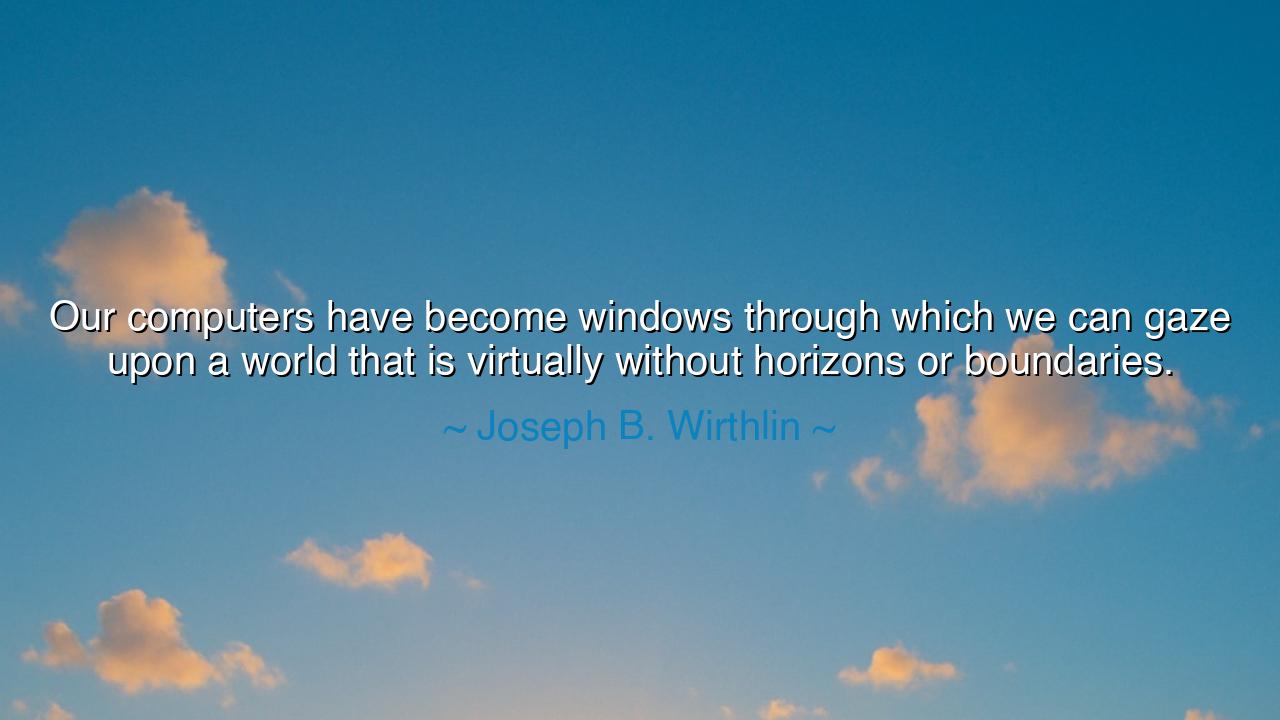
Our computers have become windows through which we can gaze upon
Our computers have become windows through which we can gaze upon a world that is virtually without horizons or boundaries.






"Our computers have become windows through which we can gaze upon a world that is virtually without horizons or boundaries." These words spoken by Joseph B. Wirthlin powerfully capture the essence of the age in which we live. Through the advent of computers, we have gained access to a world that stretches beyond the physical confines of our immediate surroundings and into a limitless expanse. In many ways, Wirthlin’s statement reflects the transcendence of the human experience through technology, where borders—be they physical, cultural, or ideological—are increasingly irrelevant. Computers have become not just tools, but windows to a universe of information and connection, providing us the means to explore, learn, and engage in ways never before imagined.
In the ancient world, explorers like Homer and Herodotus used stories and writings to open the minds of their listeners to distant lands and new ideas. Their epic tales served as windows into the unknown, where people could imagine and understand the world beyond their villages. Just as the ancient Greeks ventured across vast seas and through uncharted lands in search of knowledge, so too do modern humans navigate the digital seas, seeking new understandings and connections through the virtual world. Yet, just as ancient explorers were often limited by the physical boundaries of their time, modern explorers face the challenge of ensuring that the vastness of the digital world does not overwhelm them, or lead them astray from what truly matters.
Consider the story of Alexander the Great, whose ambition to conquer the world was driven by a desire to expand his knowledge and create a legacy that would transcend the limitations of his time. Alexander, with his army, ventured beyond known territories and conquered lands far and wide. The horizon for him, and for his people, was constantly being expanded through exploration and conquest. In many ways, computers today offer a similar sense of expansion, allowing us to push past traditional boundaries of geography, culture, and communication, entering a realm of unprecedented possibility. Yet, unlike Alexander’s journey, which was rooted in physical conquest, the world we now explore is virtual, and the challenge lies in how we navigate the complexity and vastness of information without losing our way.
The internet and the digital world have become our modern "horizon", where the possibilities seem endless. Computers, through their networks, connect us to places and people across the globe, allowing us to communicate, collaborate, and learn in real-time. Wirthlin’s words remind us that our understanding of the world has radically shifted from a limited, localized perspective to a vast, interconnected reality. We no longer need to travel for months to discover distant lands; instead, we can gaze upon them with a simple click. This empowerment brings with it the promise of progress, but also the burden of responsibility—for the more we see, the more we must understand, and the more we encounter, the more we must choose how we engage.
Yet, there is a danger in such boundless access. The ancients often warned about the perils of too much knowledge without the wisdom to process it. Socrates, in his pursuit of wisdom, cautioned that without self-reflection and philosophical grounding, the pursuit of knowledge could lead not to enlightenment, but to confusion and misdirection. In the same way, modern explorers of the digital world may find themselves lost in a sea of information. Computers give us access to infinite possibilities, but they do not guide us on how to use that knowledge wisely. The lack of boundaries in this digital age can lead to an overload of information, where the true purpose of knowledge—growth, connection, and understanding—can become obscured by the sheer volume of content available.
The lesson here is one of balance and discernment. Wirthlin’s quote serves as a reminder that while the virtual world offers us unprecedented access and opportunities, it is up to us to approach it with purpose and intention. Just as the ancients knew the importance of understanding the world around them through reflection and wisdom, we too must navigate the vastness of the digital realm with a sense of direction. The computer, much like the ancient map or compass, is a tool that helps guide us, but only if we know how to use it. The true gift of our age is not in how much we can see, but in how wisely we choose to engage with the world before us.
In practical terms, this means we must engage thoughtfully with technology. We should not allow ourselves to be lost in the endless scroll of digital content, but should instead seek to use computers as tools for meaningful interaction and personal growth. Just as the ancient explorers sought not just to conquer lands, but to understand them, so must we approach the digital world as a space for discovery, learning, and connection. We must ensure that while the horizons may be vast, our focus remains clear, and our purpose steady. By embracing the wisdom of the ancients, we can navigate the digital world not just as passive spectators, but as active participants, seeking to enrich our lives and the lives of others through the power of technology.






AAdministratorAdministrator
Welcome, honored guests. Please leave a comment, we will respond soon